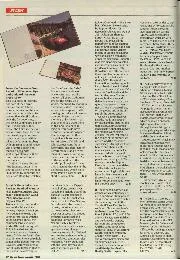
Authentic Lotus Elan and Plus 2 (1962-1974)
Those needing advice, assistance with maintenance or just a good read about popular classic sports cars have quite a choice among recent titles. Thus MRP have Paul Robinson's and Christopher…
AND THEY CALL THIS LOGIC!
The sports-car owner has always been a villain in the eyes of magistrates and coroners, and certain incidents of the last few months have brought forth a resounding volley of abuse, which has been given top-of-the-page honours in the Press.
Most significant of all was the fatal accident in which two undergraduates lost their lives on the Oxford by-pass. Their car crashed into the back of a stationary lorry at night. Their speed was estimated at 50 m.p.h., which is the usual cruising speed of small family saloons on arterial roads. And yet the fact that the people involved in this accident were travelling in a sports car, prompted the coroner to say that he would like to see all such cars banished from public roads and confined to racing tracks. More unfortunate than the expressions of such Opinions by individual officials is the prominent Position given to them in the national Press. The propensity of the general public for swallowing such ” news ” items without mental mastication might well result in a ttniversal antipathy towards sports cars as a type, an antipathy which would naturally
demand and obtain restrictive legislation. What is peculiarly gallinR about the whole matter is that it is almost impossible to
define a ” sports ” car. It would be interesting, but quite futile, to find out who was the public enemy who first invented the description. Nowadays there are many saloons which bear not the slightest resemblance to the usual conception of a sports model, and yet which have a higher maximum speed and better acceleration than rakish, open twoor fourseaters. On the other hand, the road-holding, steering and general ” feel ” of the latter entitles them to be called, for want of something
better, sports models. Just to make things a bit more complicated, it often happens that the chassis of these ” sports models ” is fitted with dignified saloon coachwork . . .
Our answer to the definition problem would doubtless, and quite needlessly, terrify our logical magistrates and coroners. It is that the so-called sports car (by which we refer only to those cars developed by racing, and not to coachwork sports models) is in actual fact a modified racing car. Those ultra-rapid saloons to which we have already referred are, on the other hand, merely high-speed touring cars, without the distinctive control of the modified racing car. Looked at in this light, by someone with knowledge, if not experience, of the inherent safety of a modified racing car, who would dare say that this type is more dangerous than big saloons whose maximum speed may have been developed out of proportion to their stability and cornering abilities? Each can be driven quickly by a skilled driver without endangering other road users. Each can be equally
them motor to the courts, be debarred from using the publie highway? Even if the words ” sports
car ” were sedulously avoided by every motoring journal and manufacturer, the phrase would persist. One thing can be done, and that is to appeal to every sports-car owner to exercise great care in his driving behaviour. . Only by removing every avoidable cause for complaint can the accusations of ignorant officials be effectively countered. dangerous in the hands of the incompetents. But do we ever hear our magistrates expressing the hope that the type of big, comfortable saloons in which many of